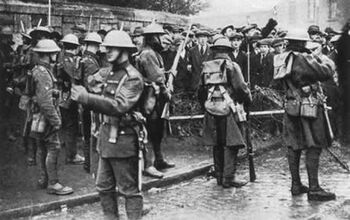Kyotakavian general strike (1924)
| 1924 General Strike | |||||||
|---|---|---|---|---|---|---|---|
 Svozgardan Soldiers at a picket in Stenzgord. (24 July 1924) | |||||||
| |||||||
| Belligerents | |||||||
|
|
| ||||||
| Commanders and leaders | |||||||
|
KUWC KUSSC |
Kyotakavian Government Svozgardan Armed Forces | ||||||
| Strength | |||||||
| ~4,100,000 striking workers |
35,000 Police officers 7,500 PISF officers | ||||||
| Casualties and losses | |||||||
|
| ||||||
The 1924 general strike in Kyotakavia was a general strike that lasted for 29 days from 3 July to 1 August 1924. It was called by the President of the Kyotakavian Union and Workers Council (KUWC) in response to the Populist-Traditionalist government of Stefan Kobovic who had announced a series of cuts to the then nationalised coal industry. These cuts were primarily a response to increased tithes to Svozgarda and came in the form of cuts to wages, sub-inflation pay rises, a removal of benefits including healthcare and an announcement of job cuts by closing at least 68 mines in the "Coal Belt".
A strike was proposed at the onset of the plans announcement in June, with the KUWC intending to force the government to withdraw their proposals. The strike was eventually called, with an estimated 4.1 million workers from across the Kyotakavian economy walking out beginning on 3 July, representing a total of close to 17% the national workforce. By 8 July the economy was completely crippled, and vast swathes of industry had ground to halt. By 13 July the Populist-led government, finding itself unable to draw on enough police resources and struggling to find officers who were not at least in part sympathetic with the workers, issued a request to Svozgarda to deploy the PISF in order to force workers back, specifically taking aim at the most northern states. The request caused political and popular uproar, and was seen as a betrayal. Two Nodstok Populist Representatives stood down from their seats, and at least three junior ministers resigned in response.
Publically, the request and the subsequent arrival of PISF officers in mining towns in Nodstok nearly resulted in a rebellion, and after several tense stand offs incidents of shooting occured as the PISF opened fire at picketers in Stenzgord, Albaniv and other mining communities in western Nodstok and north-eastern Jepultipac, killing 234 (Including KUSSC Representative for Albaniv, Georgikov Alexi and wounding nearly 1,000.
By 24 July, most workers had been forced back in Nodstok and Jepultipac and on the 1 August, the strike was officially ended, however political and public fall-out from the strike, and specifically the shootings, sent shockwaves through Kyotakavian politics. The Populists' lost the Mustekic by-election and only narrowly retained their seat in Tzemiov, a sign of outrage in the communities which had otherwise reliably supported them, foreshadowing the loss of every "Coal Belt" seat in the 1925 Kyotakavian general election